Overview – why this project matters
The Illawarra Escarpment State Conservation Area is a treasured natural landscape, rich in environmental, Aboriginal cultural and historical significance, located on the doorstep of Wollongong city.
The NSW National Parks and Wildlife Service (NPWS) has been working in partnership with Wollongong City Council and other stakeholders to deliver a sustainable mountain bike network that protects the park’s values, while providing sustainable and inclusive opportunities for mountain biking.
The project aims to deliver a sustainable alternative to the unsanctioned mountain bike trails at Mount Keira and other areas in the Illawarra Escarpment State Conservation Area, which risk environmental and Aboriginal cultural values and public safety.
Key project outcomes
At its core, this project is about protecting what matters. The NSW Government and the local community are working together to create a sustainable alternative to unsanctioned trails to:
- safeguard the escarpment’s natural and cultural heritage
- provide an enriching and inclusive riding experience for the community
- build understanding and respect for the area’s environment and Aboriginal and historic cultural heritage values
- provide a valued legacy for future generations.
In 2022, the NPWS and Wollongong City Council endorsed the Illawarra Escarpment Mountain Bike Strategy, informed by extensive stakeholder consultation and technical assessments. The strategy provides the framework for a sustainable trail network that balances mountain biking with the protection of the park’s values.
What's being delivered
The project proposes to deliver around 70 kilometres of carefully crafted mountain bike trails catering for all ages and levels of rider. The network will include:
- Kembla mountain bike trails, Stage 1 and Stage 2
- Balgownie mountain bike trails.
A key outcome of the project is ensuring accessible riding options. Adaptive riding experiences are included in the strategy, guided by the NPWS Accessible Parks and Cycling policies, input from Wollongong City Council and accessibility experts.
In line with the strategy, once Stage 1 Kembla mountain bike trails are opened, the NPWS will begin the progressive closure and rehabilitation of unsanctioned mountain bike trails at Mount Keira and other areas in the Illawarra Escarpment State Conservation Area.
Project timeline
The timeline below summarises the indicative project delivery milestones. This is subject to change due to weather and other unforeseen issues.
-
2015–2018
- Initial consultation on the sustainable mountain bike network and draft concept plan
- Exhibition of draft Illawarra Escarpment Mountain Bike Strategy
-
2022
- Finalisation of llawarra Escarpment Mountain Bike Strategy
- Exhibition of draft Review of Environmental Factors for Kembla trails
-
2023
- Final Review of Environmental Factors for Kembla trails
- Exhibition of draft Review of Environmental Factors for Balgownie
- Construction starts: Kembla mountain bike trails, Stage 1
-
2024–early 2025
- Construction continues: Kembla mountain bike trails, Stage 1
- Planning and approvals for Balgownie and Stage 2
-
Mid-2025
- Opening of Kembla mountain bike trails, Stage 1
- Commencement of closure and rehabilitation of unsanctioned trails
-
Late 2025
- Planning and approvals for Balgownie and Stage 2 Kembla mountain bike trails
- Construction commences
-
2026
- Construction of Balgownie and Stage 2 commences
-
2027
- Illawarra Escarpment Mountain Bike Network completed
Next steps
- Planning and approvals are being finalised for the Balgownie mountain bike trails and Stage 2 of the Kembla mountain bike trails.
- The closure and rehabilitation of unsanctioned trails not included in the formalised networks will commence, in line with the strategy. This will involve collaboration with key stakeholders.
Protecting natural and cultural values
Our parks are managed to protect vital habitats and natural and cultural values while enabling sustainable visitor experiences. All infrastructure improvements undergo rigorous environmental and Aboriginal heritage assessments and approvals.
Trail use will be managed under the Environmental and Operations Plan, with closures during wet or windy conditions or for maintenance to safeguard park values, trail integrity and visitor safety – consistent with best practice across mountain bike networks.
Environmental planning and assessment
Under Part 5 of the NSW Environmental Planning and Assessment Act 1979, a Review of Environmental Factors has been completed for Kembla mountain bike trails and is being finalised for Balgownie. Each Review of Environmental Factors covers:
- environmental and cultural heritage impact assessment
- consideration of consultation feedback
- mitigation measures for adverse impacts.
The Review of Environmental Factors outlines potential impacts and management strategies underpinning construction and ongoing trail management.
- 2018: A concept plan and draft strategy are developed for sustainable mountain biking on the Illawarra Escarpment and at Balgownie.
- 2020: A revised network is proposed following public feedback on the importance of protecting values and advocating for removal of unsanctioned trails at Mount Keira and elsewhere in the park.
- June 2021: The NSW Government funds strategy finalisation and planning works.
- August 2023: NPWS engages Synergy Trails for Stage 1 construction near Harry Graham Drive.
- September 2025: Stage 1 of Kembla mountain bike trails is officially opened by Minister Ryan Park.
Following extensive stakeholder consultation, the Illawarra Escarpment Mountain Bike Strategy was finalised in 2022, providing a framework for a sustainable mountain bike network in the Illawarra Escarpment State Conservation Area.
Community input helped shape the strategy
The draft strategy was exhibited from 30 October to 21 December 2018, receiving 956 submissions from government, organisations and individuals. Feedback led to stronger cultural heritage protections and a commitment to close and rehabilitate unsanctioned trails at Mount Keira.
An alternative network between Mount Keira and Mount Kembla was identified to provide a sustainable option for riders. In December 2022, NPWS and Wollongong City Council endorsed the final strategy, which permits the designated mountain bike network and outlines approvals, legislation, track closures, accessibility, signage and the operational framework for managing mountain biking on the escarpment.
Stage 1 of the Illawarra Escarpment Mountain Bike Network was opened by Minister Ryan Park on 15 September 2025.
The Kembla mountain bike trails offer nearly 20 km of sustainable trails for all ages and skill levels, with supporting infrastructure such as car parks provided by Wollongong City Council. For visitor information, go to the NPWS Illawarra Escarpment Mountain Bike Network webpage.
Planning and approvals for Stage 2 are currently being finalised. For more information, see:
Following the exhibition of the draft Review of Environmental Factors in late 2023 and further stakeholder consultation, we are refining the network alignment to facilitate more suitable access. We appreciate all feedback and expect the final Review of Environmental Factors and network alignment to be published on the project webpage in the coming months.
See the Balgownie Mountain Bike Track Network draft review of environmental factors.
The Illawarra Escarpment State Conservation Area, including Mount Keira, is a special place of Aboriginal cultural significance and natural heritage values. The safety and environmental and cultural impacts of unsanctioned mountain bike trails at Mount Keira and elsewhere in the park affect these values.
The new network will provide a sustainable and authorised mountain biking alternative on the Illawarra Escarpment, in line with rigorous environmental and cultural heritage assessment and planning approvals.
Following the opening of the Kembla mountain bike trails, unsanctioned trails at Mount Keira and elsewhere in the park will be progressively closed and rehabilitated, to protect the environment and cultural heritage values, and visitor safety.
This will be completed in a staged approach and will include the removal of structures, erosion management, revegetation, signage, education, compliance and a monitoring program.
We recognise that community input adds value to our work and work closely with stakeholders to ensure community aspirations for the project are considered.
NPWS and Wollongong City Council have hosted meetings and workshops, including consultation with Aboriginal stakeholders to protect cultural heritage and guide sustainable delivery of the network.
The Illawarra Escarpment Mountain Bike Advisory Group supports ongoing collaboration and communication between NPWS, Wollongong City Council, stakeholder organisations and the community. Members include representatives from Aboriginal organisations, community groups, tourism bodies, government departments, conservation groups and mountain biking organisations.
We will continue to engage with the community in a meaningful way as the project continues.
Does the mountain bike network include trails at Mount Keira?
Mountain biking on Mount Keira is not appropriate, given its cultural significance, geological instability and high natural conservation values. Unsanctioned trails are often poorly constructed and can have a significant impact on natural and cultural values and visitor safety.
Stage 1 Kembla mountain bike trails provide a legal and sustainable alternative. Additional trails will be delivered in this area of the park, as part of Stage 2 of the project.
Who will manage the trails?
The NSW National Parks and Wildlife Service will be responsible for ongoing management of the mountain bike track network, with Wollongong City Council responsible for managing supporting infrastructure, car parking and traffic management.
A volunteer trail maintenance program has also been established to provide an opportunity for the community to ‘give back’ to the trails and help keep them in good shape.
How will the network be sustainable?
The network is designed for rider experience and visitor safety while protecting natural and cultural values. Trails incorporate features like bridges, raised platforms, and rock armouring where needed, to protect the trails and the park – similar to safe walking track construction.
A well-built network reduces long-term maintenance costs and resource demands. Trail use will be managed under the Environmental and Operations Plan, with closures during wet or windy conditions or for maintenance to protect park values and safety – consistent with best practice.
Our approach is guided by the Cycling policy, Cycling strategy and NSW cycling strategy: guidelines for implementation.
Promoting safe and responsible riding
The focus of visitor communications for the network is the promotion of safe and responsible riding. 'Ride lightly' messaging will be promoted through webpages, signage, education and marketing campaigns. We are also partnering with the Wollongong Mountain Bike Club to build stewardship and a positive culture for the network.
What will happen to the unsanctioned trails not included in the mountain bike strategy?
Following the opening of Stage 1 of Kembla mountain bike trails, the NPWS will commence the progressive closure and rehabilitation of unauthorised trails not included in the Illawarra Escarpment Mountain Bike Strategy. This will be carried out in collaboration with key stakeholders.
Project updates
Delivery of Stage 1 of the Kembla Mountain Bike Trails is progressing well and is on schedule for opening in mid-2025.
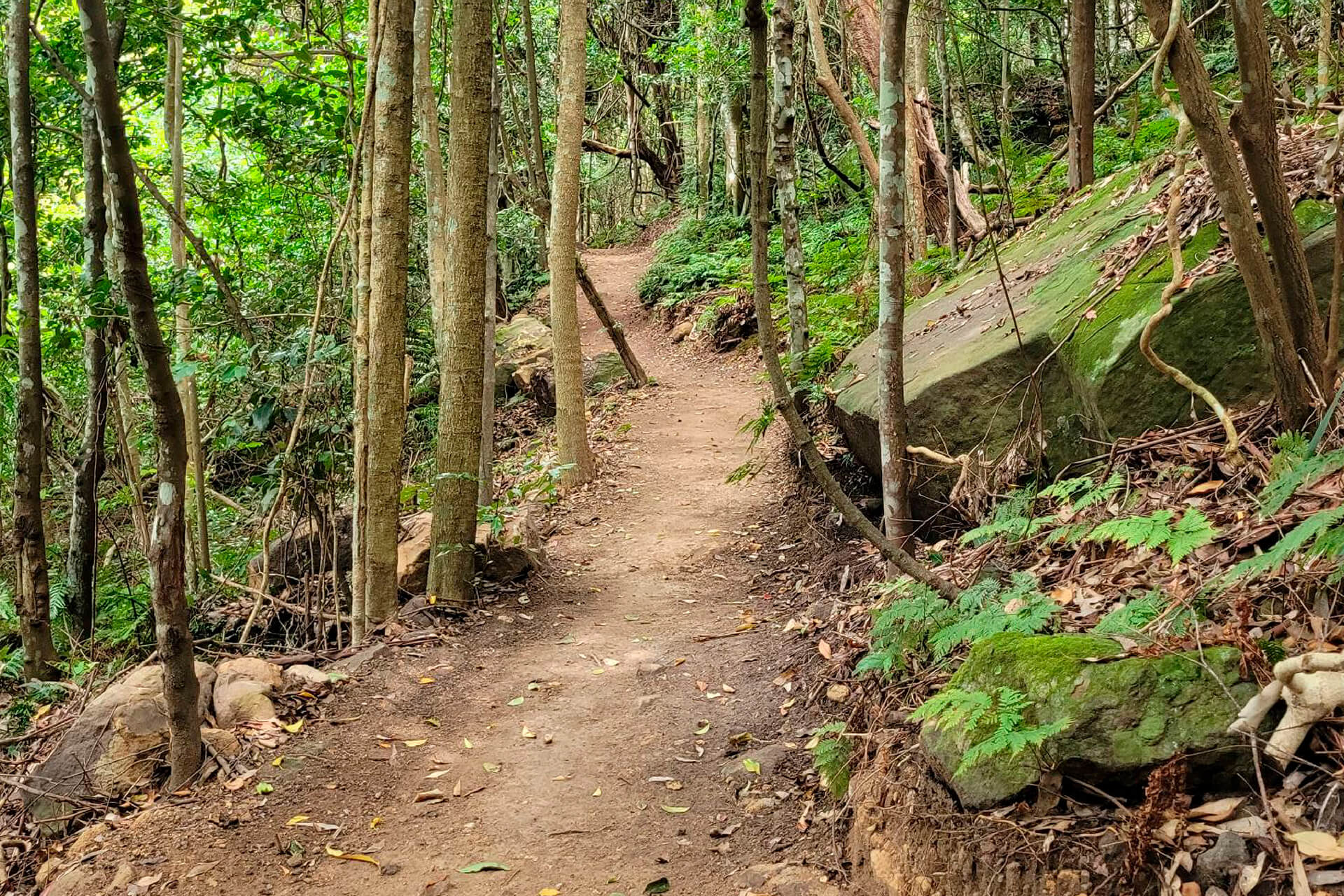
The delivery of the new 70-kilometre sustainable mountain bike experience in Illawarra Escarpment is progressing well.
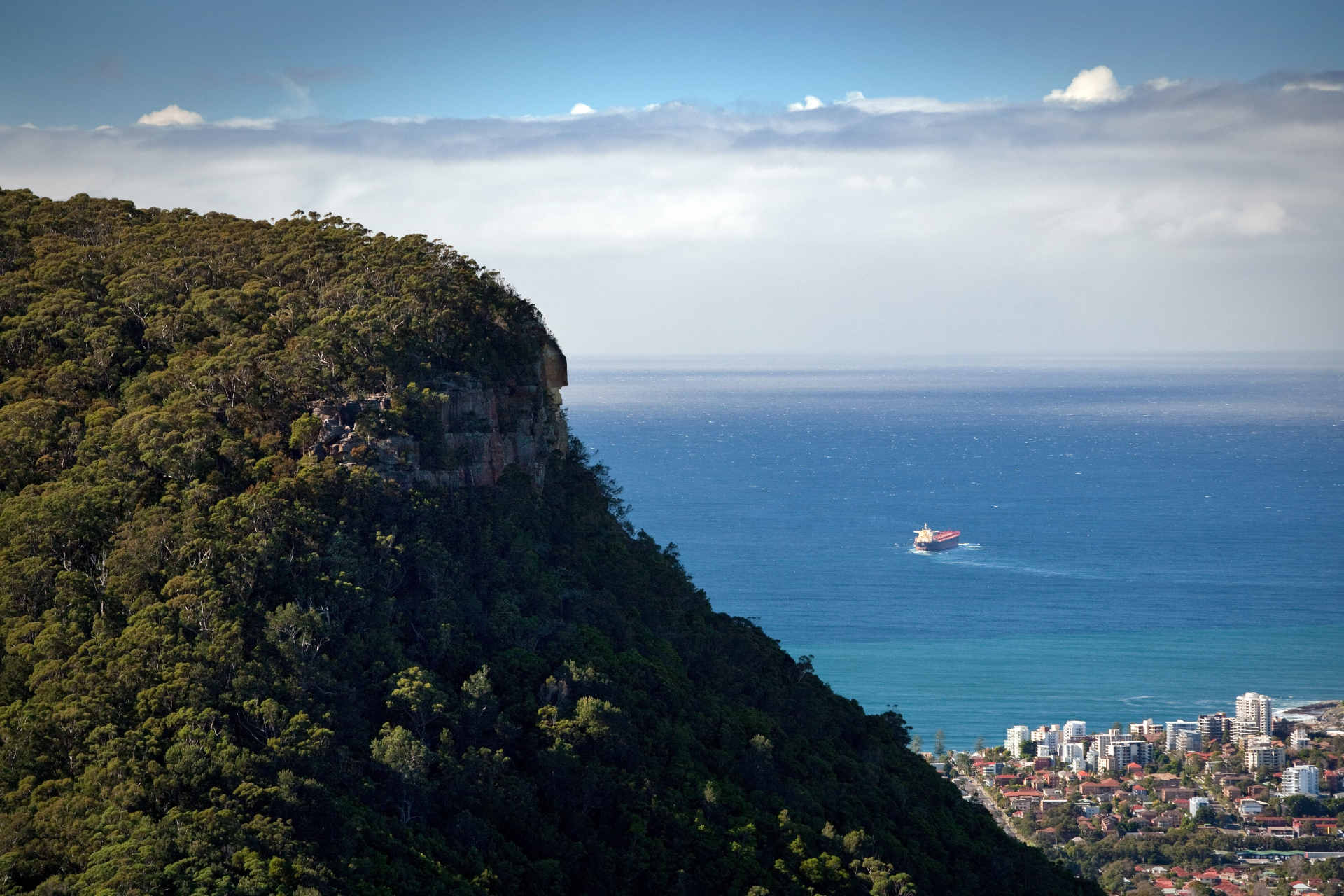
The delivery of the new 70-kilometre sustainable mountain bike experience in Illawarra Escarpment is progressing well.
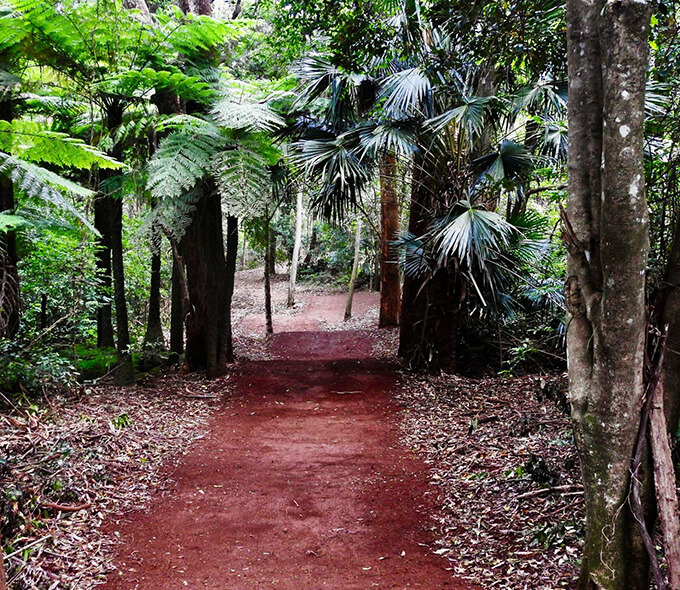
Read the latest update about the Illawarra Escarpment Mountain Bike Network project.
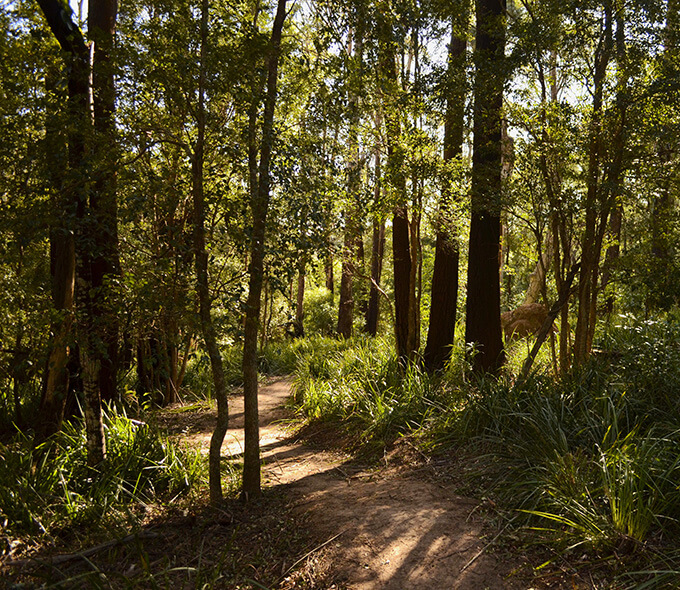
It is now time to reach out and reconnect with our neighbours, park users, stakeholders, local communities and the wider community to provide updates as the project develops.
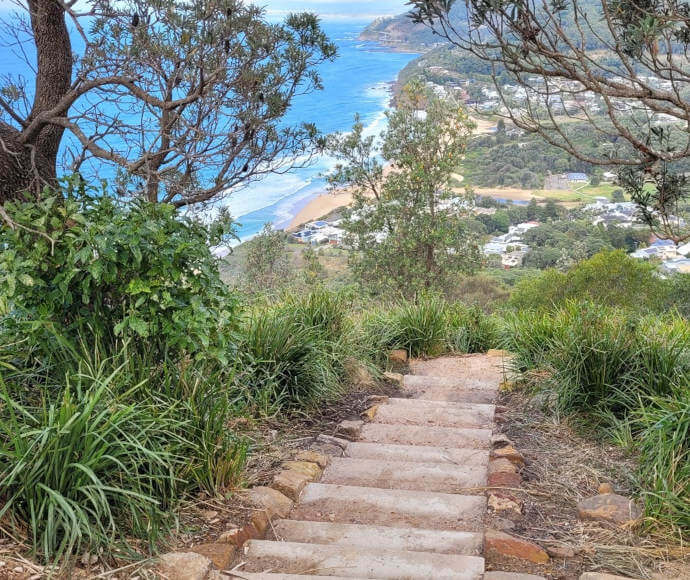
Register for updates
To register for project updates, please contact us or complete the registration form.
The Department of Climate Change, Energy, the Environment and Water is collecting your personal information.
Why are we collecting your information?
We are collecting your information so we can provide you with updates about this project.
How will we share your information?
We will not share your information with anyone else unless you give your consent, or the law requires or allows us to do so.
Are you required by law to give us your information?
You are not required by law to give us your information but, if you choose not to, we cannot send you updates about this project.
Your right to access and correct your information
To access or correct your information, please contact:
Information Access and Privacy Unit
Locked Bag 5022, Parramatta NSW 2124
Phone: 02 8275 1095
Email: [email protected]
More information
For more details on how your information is handled, please refer to Privacy and security.
More information
- Illawarra Escarpment Mountain Bike Strategy
- Balgownie Mountain Bike Track Network: draft review of environmental factors
- Submissions report: Illawarra Escarpment Mountain Bike Project - Network 1, Mount Kembla draft review of environmental factors
- Illawarra Escarpment Mountain Bike Project – Network 1, Mount Kembla Review of environmental factors
- Illawarra Escarpment Mountain Bike Project: draft review of environmental factors
- Illawarra Escarpment Mountain Bike Strategy Public Exhibition Report
- Illawarra Escarpment Mountain Bike Concept Plan
- Illawarra Escarpment State Conservation Area Plan of Management
- Legal trails on Kembla: Flow Mountain Bike
